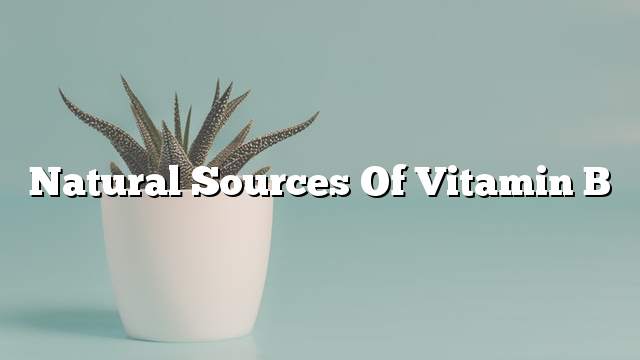Vitamin B
Vitamin B is one of the vitamins that are soluble in water. This vitamin should be taken daily and in sufficient quantities. This vitamin has many functions in the body, including regulating the process of producing energy in the body. It has a role in nerve cells. It helps the enzymes to function. And contributes to the production of red blood cells, and vitamin B has several types: B1, B2, B3, B5, B6, B7, B9, B12.
Sources of Vitamin B
Vitamin B 1
This type of vitamins is necessary in the completion of nerve processes, and helps in the production of energy from carbohydrates, fat and protein, and also helps the muscles to do work, and the sources are:
- Chicken, fish, and meat.
- Dairy products and derivatives.
- Liver.
- Yeast.
Vitamin B2
Also called riboflavin, this vitamin works to protect tissues and skin, helps in the production of energy from food, it also helps in the process of oxidation and reduction, also contributes to the production of red blood cells from the bone marrow, activates the optic nerve, and can get vitamin B2 from several sources Of which:
- Green vegetables.
- Milk.
- Red meat, fish.
- Yeast.
- Nuts of their kinds.
- eggs.
- Liver.
Vitamin B3
Vitamin Niacin is a vitamin B3. This vitamin maintains the health and safety of the nervous system, and the skin, which is necessary in the process of growth, and helps to facilitate the entry of oxygen to the cells with some enzymes, and it opens the appetite, and helps to represent the body of fats and sugars, With its high thermal capacity, it is not affected by heat during cooking, oxidation or even light. Sources are:
- Meat, Chicken, Fish.
- Leafy vegetables such as spinach, and mallow.
- Dairy and its derivatives.
- Islands.
- Dates.
Vitamin B5
Also called pantothenic acid, helps in the natural growth and health of hair, which is part of the important compounds that work on the analysis of fatty acids, and the manufacture of cholesterol, and has several sources, including:
- Liver.
- Dairy products.
- Vegetables, and legumes.
- Red Weft.
- eggs.
Vitamin B6
Called pyridoxine, and this vitamin works on the formation of antibodies that resist bacteria, and works on the analysis of non-essential amino acids, as well as analysis of glycogen, to produce energy, as well as vitamin B6 is important in the development of children properly, and important in maintaining the health of the nervous system and blood vessels, Controls the neurotransmitters, and their sources are:
- Meat.
- Liver.
- Dairy products.
- Cabbage.
- Potatoes.
- the banana.
Vitamin B7
Vitamin Biotin, works to stimulate the secretion of insulin, helps in metabolism, and also makes antibodies and some enzymes.
Vitamin B7 is present in all foods, especially yeast, and liver.
Vitamin B 9
Called folic acid. It works on the formation of nucleic and amino acids. It is linked to the development of both the brain and spinal cord of embryos. It is found in eggs, butter, green vegetables and some fruits.
Vitamin B12
Vitamin Kopalamin, this type of vitamin protects from anemia, works on the red blood cells ripening, and helps significantly in the formation of DNA, and maintains the fibers surrounding the nerves. The sources of this type of vitamins are only animal, including red meat, fish, chicken, and eggs.
